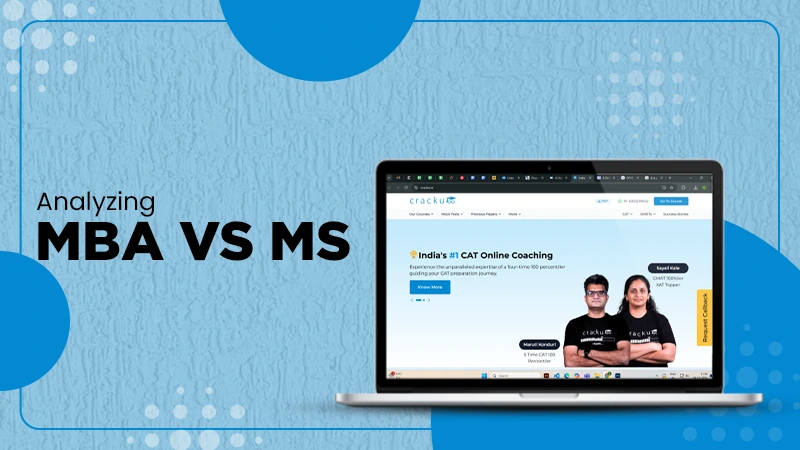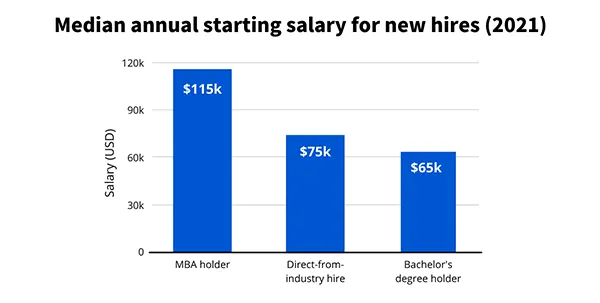
By the end of the 3rd year of my undergraduate degree, I was confused as to what to do. Should I attend CAT online coaching and get an MBA degree right out of college, or should I go ahead and complete my academic degrees first?
Many students like me stand at a crossroads — whether to continue in their academic or professional careers. Naturally, an MBA or an MS are the two most evident options (Notre Dame de Namur University). Both paths have their advantages and are suited to different career aspirations.
Hence, my this blog looks into the differences, advantages, and considerations to help you decide which route might better suit your goals.
The Difference — MBA vs. MS
An MBA is a professional degree’s curriculum focuses on leadership, managerial, and business acumen. The degree is quite versatile in nature and caters to people who want to find themselves in management, strategy, or entrepreneurship. Try to understand that people who wish to work in the social sector also get an MBA. Doing an MBA is, in fact, a very versatile degree.
A master’s degree, however, is a specialized one that focuses on a particular area, such as:
- Engineering,
- Data science,
- Finance, or
- Healthcare.
It tends to be more research-intensive and appeals to those people who want technical expertise or pursue an academic career. Since an MS (Master’s Degree) is highly specialized, the learnings are very different as well.
While both degrees are postgrad programs, they serve vastly differing professional paths.
MBA vs MS – A Breakdown
For a bright career ahead, both degrees can serve as great opportunities for you. To get a better picture of the scene, keep reading:
Career Goals
The long-term career objectives of an individual decide whether he or she needs an MBA or an MS.
If you wish to lead teams, make strategic business decisions, or start your venture, then an MBA is the right option. Since the curriculum of an MBA is very diverse, the graduates can work in any field.
However, if your interests are in technical areas, such as artificial intelligence, biotechnology, or quantitative research, an MS might be a better fit for you. The program goes much deeper into technical topics and often involves a thesis or capstone project that demonstrates your skills.
Hence, the more specialized or rather, niche-based your career goal, the more you should tilt towards an MS.
Curriculum and Learning Approach
An MBA program curriculum is quite wide and interdisciplinary, ranging from courses in economics to marketing, organizational behavior, and data analytics. Group projects, case studies, and internships are a significant part of the learning process and contribute to collaboration and practical problem-solving skills. MBA programs are extremely rigorous.
You won’t even have time to eat, let alone sleep.
Whereas, the MS programs are more academically rigorous, research-intensive, and will include advanced coursework in one discipline. Many conclude in a research project or even a dissertation. This might be the best option for those who enjoy diving into a topic and contributing to academic or applied research.
Hence, while both are serious domains, the demands of each degree are different. While the MBA asks you to be well-rounded and dabble across various areas, your MS will be stricter in a pin-pointed predefined direction.
Return on Investment – MBA vs MS
When it comes to higher education, ROI is a major factor of consideration. The average pay increase for an MBA is substantial, and it would be even more so from a top-tier institution. The degree is very respected in consulting, investment banking, and technology management circles.

MS graduates also have a competitive advantage in their field of work, especially in the technology, engineering, and healthcare sectors. However, the ROI may vary depending on the specialization and location. For example, an MS in computer science from a top U.S. university may lead to great opportunities in the tech industry.
CAT Syllabus and Its Relevance
For those who are considering an MBA in India, you must know about the CAT syllabus in detail. For instance, the Common Admission Test, or CAT for short, is the onlyway to access some of India’s most elite business schools that include the IIMs.
The syllabus lays emphasis on three broad areas/sections:
- Quantitative Ability,
- Verbal Ability and Reading Comprehension, and
- Data Interpretation & Logical Reasoning.
Candidates aspiring for such a seat need a strong understanding of these sections.
The VARC section tests your comprehension skills, typically a CAT VARC section includes 4 passages with 4 questions each. Next, as far as Verbal Ability is concerned, you will be tested on various topics such as para summary, para jumbles, etc.
The LRDI section is a nightmare for most. This section has no predefined syllabus. It involved general puzzles and logical reasoning-based DI(s).
The QA section of the CAT is the only section with a predefined syllabus. It stretches across roughly 22 topics which can be categorized under 7 blocks.
CAT preparation, which is often supplemented with CAT online coaching, assists the student in streamlining his study schedule and focusing on weak areas. Analytical skills developed during CAT preparation can also be beneficial in the MBA program, especially in subjects like finance and operations.
Geographic Considerations
Where you are planning to study and work is another key factor. MBA programs in the U.S., Europe, or India vary by structure, cost, and industry connection.
DID YOU KNOW?
An MBA from an Ivy League school in the U.S. would open global opportunities, whereas an MBA from IIM in India is well-valued in the Asian market.
Similar to this, MS programs vary by location. Countries such as the U.S., Canada, and Germany are popular for MS degrees due to their advanced research facilities and thriving job markets for technical professionals.
Work Experience Requirements
MBA programs often require applicants to have a few years of work experience. This is because the degree builds on real-world business scenarios and professional insights. This requirement ensures that students can contribute meaningfully to discussions and group activities.
Whereas, MS programs are more flexible regarding work experience. Many students transition directly from undergraduate studies to an MS, as the focus is on academic knowledge and technical skills rather than professional experience.
So, to be in a good MBA college, you require decent academics and work experience, while in some cases they are willing to relax on both. However, in MS programs you must have an exceptional academic record and it is better if coupled with certain research publications in the same domain.
Networking Opportunities
Another huge plus to earning an MBA is the networking opportunities available. The focus of many MBA programs is on peer learning, alumni connections, and industry interaction. For career advancement, entrepreneurship, or moving into new industries, such networks can be invaluable.
The MS programs do not tend to place as much value on networking, but in academic and technical communities, the connections are strong. People who pursue research or enter academia find these networks can be equally valuable.
Cost of Education
Both MBA and MS programs are expensive, but the costs vary widely based on the institution, country, and duration of the program. MBA programs, particularly those at renowned institutions, often come with hefty tuition fees. However, scholarships, employer sponsorships, and post-graduation salaries often offset these costs.
Another great option can be going to a government college. Distance learning, online MBA, and government colleges have also started providing MBA degrees. But nothing can match the value of an MBA from a reputable college.
MS programs are generally cheaper, especially in countries with subsidized education like Germany. Moreover, research or teaching assistantships can cut down the costs even further.
Final Thoughts
Both the MBA and MS degree have their own opportunities for improving your skills, knowledge, and career prospects. An MS motivates you toward technical expertise and specialized fields while an MBA opens doors to leadership and management roles. Proper planning and preparation will make either pathway worthwhile it is CAT online coaching for an MBA or rigorous GRE preparation for an MS.
Remember, there is no one-size-fits-all answer to this dilemma. Choose the path that aligns with your aspirations, and you’ll be well on your way to a fulfilling and successful career.
Frequently Asked Questions
Ans: An MBA is a professional degree aimed at business leadership, management, and strategy, while an MS is a special degree that focuses on technical or research-oriented fields. The MBA prepares you for leadership roles across industries, whereas an MS is more suited for technical expertise or academic careers.
Ans:
Most MBA programs require 2-5 years of work experience because the programs are focused on practical business scenarios and leadership. For an MBA in India, work experience is not mandatory. MS programs, however, usually do not require any work experience and take in students right after completing undergraduate studies.
Ans:
Generally, the ROI on an MBA is higher when done from a top-ranked college, especially in sectors such as consulting, finance, or tech management. However, the ROI of an MS degree is pretty decent as well, more especially in fields like computer science or engineering, and results mostly depend on specialization as well as the job demand.
Ans: CAT syllabus stresses quant and verbal ability with basic logic and data interpretation-the core areas that hone in-depth analytical and problem-solving skills. These three pillars form the foundation to conquer any MBA coursework as well as managerial decision-making careers. Not only that, you will also learn about strategy.
Ans: Your decision should depend on your career goals, interests, and strengths. Choose an MBA if you’re more inclined toward leadership and business strategy. Opt for an MS if you want deep technical knowledge or to pursue a specialized field. Look at factors like cost, location, and the possible career paths each degree would offer.